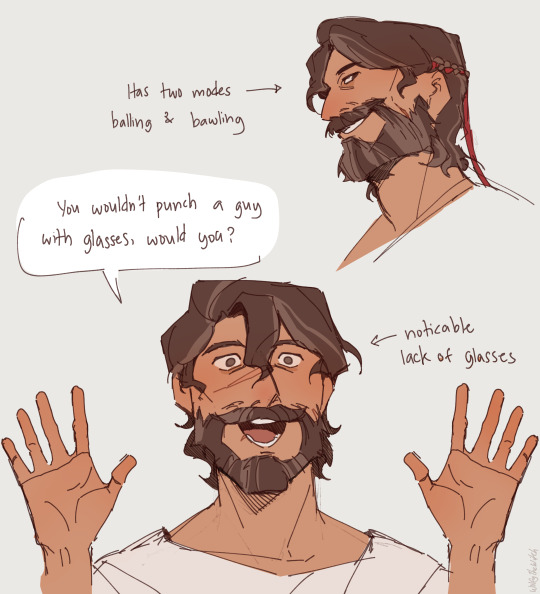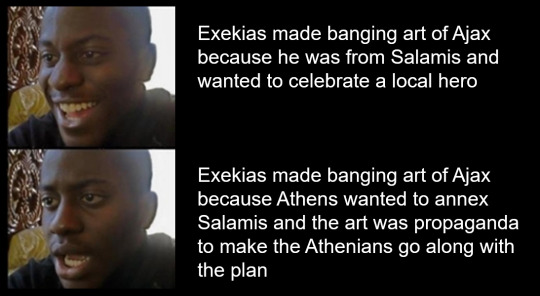#telamonian ajax
Text
Was doing some research on Diomedes and found out Tydeus was a pupil of Athena, a favorite of hers to the point she offered him immortality. He was a man blessed by the gods and yet, his actions disgusted the gods himself. In battle, Tydeus ate the brains of his enemy. An act so barbaric and out of line that it lost him the blessing of Athena.
Why did that happen? How come Tydeus decided to take that barbaric action? The act most certainly did not represent Tydeus’ character (if it had why would Athena be surprised and shocked?). Could one blame the gods? Striking Tydeus with madness? Or was it simply a fatal flaw in the king? A rage so unnatural and overbearing that it took control of him completely — a flaw overlooked by the gray-eyed goddess. A mistake that she would not commit again.
Diomedes himself is typically characterized as short-tempered and prone to anger, although he has far more self control and respect than any of the other greek kings (except for Nestor I suppose). He was mentored and sculpted into the man he was in the Trojan war by Athena herself, aiding him at all times, blessing him more than she did even Odysseus. She felt she owed the family of Tydeus, most likely treating them much like she treated Odysseus’ family in the Odyssey.
She most certainly succeded in preparing Diomedes to be such a great warrior, Aeneas comments that he was second only to Achilles in the greek army (although typically it is Telamonian Ajax who is said to be the second strongest greek) and Diomedes is most certainly one of the highest-trusted greeks in the army (It is he who is entrusted with the espionage to Troy, and it is he who is tasked with choosing who will follow HIM). Diomedes also has armor made by Hephaestus himself! An honor only appointed to Achilles. He was beloved by the gods, most definitely, and talented in all parts of war — talent which certainly came from his experience taking Thebes to avenge his father.
Diomedes shows incredible restraint, care, and control in his time in the war. He perhaps represents exactly what a greek warrior should be. Not burdened by the suicidal rage of Achilles. Not hindered by the constant lies of Odysseus. Not tainted by the pride of Agamemnon. Perhaps that is why he went on to be worshipped as a divine being in parts of Greece.
#doob#iliad#the iliad#trojan war#diomedes#thebes#argos#odysseus#achilles#agamemnon#telamonian ajax#greater ajax#troy#tydeus#7 against thebes#greek mythology#mythology#tagamemnon
185 notes
·
View notes
Text

Red-figure cup (490 BCE) depicting Ajax menacing Hector with a spear as Athena and Apollo look on
25 notes
·
View notes
Text
Things I've learned about Ajax this week:
Heracles was his fairy godfather who blessed him with invulnerability
His myth of invulnerability predates Achilles'
Subsequently one of the earlier myths regarding his death was that Paris shot him in the heel with an Apollo-improved arrow
Other myths involved the Trojans simply burying him given they couldn't hurt him otherwise. If you can't stab a man into the Underworld, maybe just dig him door, shove him in, and block the way behind him.
His body being interred rather than cremated in the prevailing myths of his death by suicide might be a nod to that older version of his death
His method of suicide--burying the hilt of his sword in a mound of earth and then throwing himself on it--may also be a nod to earth being the only thing that can kill him. In this case, it killed him by wielding a sword.
#actually I've learned quite a bit more than this#but these were some of the fun ones#telamonian ajax#ajax the greater#it's funny I'd read a lot of essays about his death and had somehow missed this#like there is a lot of debate over why he was buried rather than cremated#I think it was Sophocles who suggested it was a punishment for the whole cow thing#but the cow thing wasn't part of every myth and Sophocles invented his motive for killing the cows#and interring bodies wasn't seen as a punishment#so yeah the idea that it's just like the only way to keep an invulnerable man down like just put him in the underworld and block his exit#tagamemnon
29 notes
·
View notes
Text
Odysseus: "Achilles-"
Achilles: "Patroklos used to call me Achilles" *sobs*
Ajax (The Greater): "Because that's your fucking name"
Achilles: *sobs harder*
#Normal Achilles behaviour#angst?#patrochilles#achilles x patroclus#incorrect quotes#telamonian ajax#ajax the greater#odysseus
12 notes
·
View notes
Text

tfw you join the army and someone else has the same name as you, then the next day everyone starts calling you "Lesser Ajax"
#the iliad#trojan war#ajax#both o dem#telamonian ajax#locrian ajax#my art#this has prob been done before But#ALWAYS funny to me that hes straight up called lesser ajax#the argives had 2 guys w the same name and the distinguishing factor they decided to go w was who was better and who was worse lmao#apt tho#fuck lesser ajax
870 notes
·
View notes
Text
Finished reading Sophocles' Ajax last night and let me tell you Teucer fucking impressed me. Man had no fucks left to give and dragged Agamemnon's ass right there. He dropped some great arguments and great lines. Favorite character of the play.
Also I now really want to look at it in the original Greek because I'm very curious to see what words exactly they are using to refer to Tecmessa. John Moore's translation consistently refers to her as his wife and Ajax even refers to her as his wife but also she's a captive, a war prize and we don't really see that happen with other women like Briseis in the Iliad so does that mean Tecmessa after being captured was somehow made his wife? Would that even be allowed? Is it because Ajax had no wife waiting for him at home that he can marry his war prize? I'm not complaining or anything I am just left with so many questions about this character. Especially when so much attention is given to the fact that Teucer is the son of a slave woman but no such attention is brought to Eurysaces, Ajax's son by Tecmessa.
It's just very fascinating and I will probably be plumbing the depths of jstor with my questions. Though if anyone has recs for articles or books discussing these kinda things please let me know.
#greek myth#greek mythology#sophocles#ajax#telamonian ajax#ajax the greater#teucer#get him teucer#i live to see people drag the fuck out of agamemnon#oh and menelaus can get fucked too#this an atreides hate account
14 notes
·
View notes
Text

what a guy
#art#sketch#the odyssey#the iliad#odysseus#greek mythology#the design is inconsistent with the timeline but he's talking to telamonian ajax
3K notes
·
View notes
Note
so I finally got around to reading your essay on mituna being a Cassandra parallel, and it was really good! But I can't help but notice that one of the sovereignstuck players is named Ajax and now I'm sweating profusely hoping there's no connection
Thank you very much, I’m glad you enjoyed the essay! And don’t worry! There’s no connection between Ajax Barrett and Mituna’s status of being a Cassandra parallel!! See, there’s actually two men named Ajax in Greek mythology- Ajax the Great, and Ajax the Lesser.
Cronus Ampora, in relation to Mituna’s myth of Cassandra, is simultaneously playing the role of Apollo, by most likely being the person who destroyed people’s belief in Mituna in the first place, and Ajax the Lesser specifically, for, well… You know what Ajax the Lesser’s relevance to Cassandra’s story is.
Ajax takes more cues from an entirely different guy- you might have noticed that his handle starts with the word “Telamonian,” which relates him very specifically to Telamonian Ajax, better known as Ajax the Great. He’s a hero of Greek mythology. Don’t worry- Ajax and Mituna are actually friends! Mituna’s his Patron, actually!
#thank you for the ask and honestly your concern was valid LOL#this is actually specifically why we put ‘Telamonian’ in his handle!#sovereignstuck#ajax barrett#sov!mituna captor#sov!cronus ampora#ajax.pdf#sov!mituna.pdf#sov!cronus.pdf#nekro.pdf#nekro.sms
25 notes
·
View notes
Text
i started writing for the big dude

#troy 2004#ajax#tyler mane#deserved more screentime#i'm basing him on telamonian Ajax because i assume he must be that Ajax#and the movie deleted Ajax the lesser#( the iliad having two guys named Ajax is confusing lol)
5 notes
·
View notes
Text
#classics#i'm torn here. first instinct is nestor but i really love the idea of human achilles sulking by the ships for the majority of the action#the iliad
77 notes
·
View notes
Text

Telamonian Ajax and Odysseus height comparison:
#odysseus#the odyssey#art#artists on tumblr#drawing#greek mythology#tagamemnon#trojan war#iliad#homeric epics#the iliad#odyssey#ajax#greater ajax#telamonian ajax#telamon#maybe I made Odysseus too tall#doodle#sketch#sketches
56 notes
·
View notes
Text

The quarrel over Achilles' arms (hydria, circa 520 BCE)
Black-figure depiction of Ajax and Odysseus fighting over which of them should be awarded (the now deceased) Achilles' weapons. Both are held back by fellow warriors as Agamemnon steps between them.
#i love how upset everyone looks. AJAX NO#telamonian ajax#odysseus#agamemnon#greek pottery#tagamemnon
10 notes
·
View notes
Text

Today in reading decades old academic arguments in Jstor...
#ajax the greater#telamonian ajax#ajax of salamis#exekias#no exekias don't make propaganda for the ruling class your so sexy aha#brb throwing myself into the sea#it's going to take a while I'm very landlocked
14 notes
·
View notes
Text
Do you think that after Telamonian Ajax's death Lokrian Ajax became "Ajax the greater by default" or did the Achaeans keep referring to him as Ajax the lesser just cause?
#ajax the greater#Ajax the lesser#Telamonian Ajax#Locrian Ajax#Thoughts I've had in the middle of the night
0 notes
Note
whomst in the Trojan war is a big spoon and whomst is a little spoon
NOW WE'RE TALKING
big spoons: helen (iykyk), agamemenon, diomedes, telamonian ajax, hektor, aeneas, helenus, patroclus, antilochus, nestor (u love that image in ur head), teucer, sthenelus, automedon.
little spoons: menelaus (shut up), achilles, locrian ajax, paris, andromache, kassandra, deiphobus, odysseus (he just can't win. he's smaller than everyone. he will be spooned and he will shut up about it), neoptolomus, eurymedon.
27 notes
·
View notes
Text
πελώριος (pelórios) is one of the adjectives used to describe Agamemnon. It means: 1) monstrous, prodigious; 2) huge, massive, enormous, gigantic, vast.
In Homeric works is usually used to describe the gods, but sometimes humans as Agamemnon and Telamonian Ajax. Sometimes it's also used to describe monsters as the Cyclops Polyphemus or the snake Python.
Iliad. 3. 166. ὥς μοι καὶ τόνδ᾽ ἄνδρα πελώριον ἐξονομήνῃς ὅς τις ὅδ᾽ ἐστὶν Ἀχαιὸς ἀνὴρ ἠΰς τε μέγας τε. / Tell me, then, who is yonder huge hero so great and goodly?
Iliad. 3.229 τὸν δ᾽ Ἑλένη τανύπεπλος ἀμείβετο δῖα γυναικῶν: ‘οὗτος δ᾽ Αἴας ἐστὶ πελώριος ἕρκος Ἀχαιῶν: / “That, answered Helen, is huge Aias, bulwark of the Achaeans”
Iliad. 5.395 “Ἀιδης πελώριος” / “huge Hades”,
Iliad. 7.208 “πελώριος Ἂρης” / “huge Ares”.
Agamemnon is also described by Priam as ἠΰς (brave, courageous), μέγας (great, mighty), and by Helen as βασιλεύς τ᾽ ἀγαθὸς (good king) and κρατερός τ᾽ αἰχμητής (strong spearman). He stands out for being big, beautiful, majestic, and a strong warrior.
9 notes
·
View notes